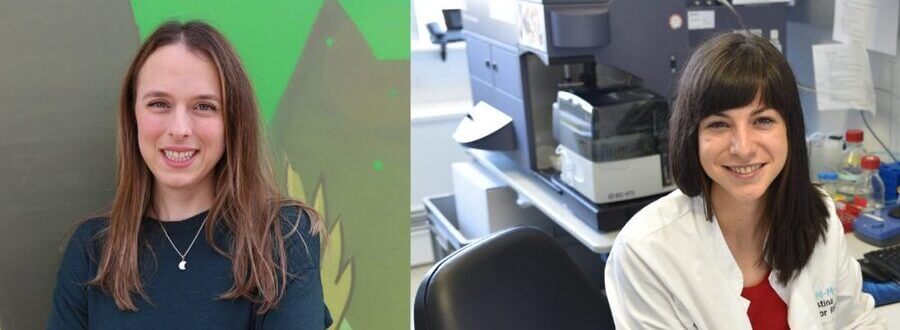
“la Caixa” Foundation and BIST launch a Chemical Biology Programme promoting two cutting-edge research groups at IBEC and IRB Barcelona
“la Caixa” Foundation and the Barcelona Institute of Science and Technology (BIST) are launching the “la Caixa” Foundation–BIST Chemical Biology Programme, aimed at advancing research in chemical biology to develop new medicines. The project kicks off with the incorporation of two new research groups at the Institute for Bioengineering of Catalonia (IBEC) and the Institute for Research in Biomedicine (IRB Barcelona), led by young researchers Irene Marco-Rius and Cristina Mayor-Ruiz, respectively, at the Barcelona Science Park.
The main objectives of this initiative are to launch a powerful research programme in chemical biology, and to attract talent through the creation of a hub in Barcelona focused on this discipline. With the collaboration of the two leading centres, IBEC and IRB Barcelona, multidisciplinary research and the establishment of an important hub in the city will be encouraged, opening the door to new chemical biology collaborations and projects.
“With this programme, the “la Caixa” Foundation takes another step forward in its firm commitment to ensuring health research is transferred to society. For more than 30 years the institution has been committed to research excellence, convinced that promoting health research means investing in people’s wellbeing”, says Àngel Font, Corporate Director of Research and Health at the “la Caixa” Foundation.
A programme to boost young talent
The programme has led to the creation of two new junior group leader positions, for which researchers Cristina Mayor-Ruiz (IRB Barcelona) and Irene Marco-Rius (IBEC) have been selected.
Irene Marco-Rius brings research excellence and international experience to her role. She obtained a master’s degree from the University of Heidelberg (Germany – “la Caixa”-DAAD Postgraduate Fellowship), and a PhD from the University of Cambridge in 2014 (UK – Marie Curie ITN Fellowship) and then, after postdoctoral positions at the University of California – San Francisco (USA) and at the Cancer Research UK Cambridge Institute, she joined IBEC in 2018 as a researcher in the Biosensors for Bioengineering group (“la Caixa” Junior Leader Postdoctoral Fellowship). Dr. Marco-Rius has been coordinating the European project Bloc since 2020.
Dr. Marco-Rius’ new position also represents a success story for the BIST To the Mothers of Science leadership programme. She was one of the winners of the 2020 edition of this programme, which aims to support mothers working in research as they advance in their respective fields, equipping them with the necessary tools to succeed in leadership roles.
Irene Marco-Rius explains that her group will focus on developing innovative molecular imaging technologies to diagnose diseases and assess early response to treatment. “The cells in our body adapt rapidly to their environment and change the way they get nutrients and energy needed to survive. My group works with technology that allows us to study these chemical reactions inside our bodies (or using tissue bioengineering), and to find markers of disease or drug responses before anatomical changes occur. For example, we can distinguish between cancer cells and healthy cells inside the body using a magnetic resonance imaging device without any pain and without the need for a biopsy.”
Dr. Marco-Rius adds that “biomedical research is very multidisciplinary, and a hub of excellence that fosters collaboration and the exchange of knowledge is needed to support scientific breakthroughs. In this respect, Barcelona as a city, and the “la Caixa” Foundation – BIST programme are key elements for us to continue our cutting-edge research“.
Cristina Mayor-Ruiz, junior group leader of the new Targeted Protein Degradation and Drug Discovery Lab, will guide its research towards targeted protein degradation, an innovative technique with important therapeutic applications.
Dr. Mayor-Ruiz holds a degree in Biotechnology from the University of Salamanca. She carried out her doctoral studies in Molecular Biology in Dr. Oscar Fernández-Capetillo’s lab at the Spanish National Cancer Research Center (CNIO), where she focused on mechanisms of resistance to cancer therapies. She then joined Dr. Georg Winter’s lab as a postdoctoral fellow at the Research Center for Molecular Medicine (CeMM) in Vienna, Austria. Her work has given rise to eight scientific articles—in five of which she is first author—published in journals such as Nature Chemical Biology and Molecular Cell.
“Chemical biology has enormous transfer potential, especially for the production of new drugs, so it’s especially interesting to promote a powerful hub of this discipline in an environment like Barcelona. We redirect mechanisms against proteins that are of therapeutic interest, for example, in the treatment of cancer and, in particular, of the pancreas, for which there is virtually no treatment currently available,” says Dr. Cristina Mayor-Ruiz.
Irene Marco-Rius also explains that her group will focus on the development of innovative molecular imaging technologies for the early diagnosis of diseases: “our body’s cells adapt rapidly to their environment and change the way they get the nutrients and energy they need to survive. My group works on a technology that allows us to study these reactions.”
» For further information: BIST website [+]




